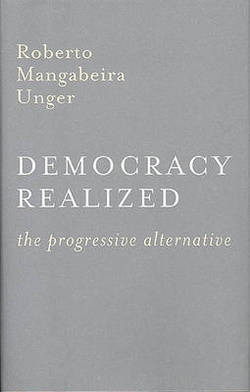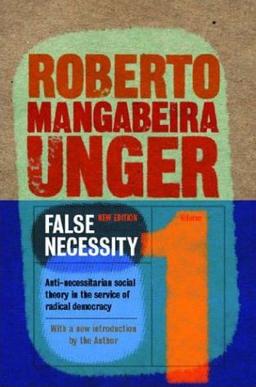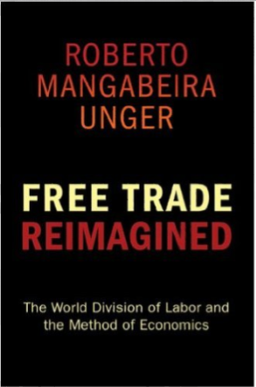Empowered democracy is a form of social-democratic arrangements developed by Brazilian philosopher and politician Roberto Mangabeira Unger, who first published his theories in 1987. Theorized in response to the repressiveness and rigidity of contemporary liberal democratic society, the theory of empowered democracy envisions a more open and more plastic set of social institutions through which individuals and groups can interact, propose change, and effectively empower themselves to transform social, economic, and political structures. The key strategy is to combine freedom of commerce and governance at the local level with the ability of political parties at the central level to promote radical social experiments that would bring about decisive change in social and political institutions. [1]
The theory of empowered democracy has received widespread critical acclaim. It has been hailed as the only such constructive vision of society in critical legal studies, [2] and the term has since seeped into the mainstream media, even if the theory has not. [3] Meanwhile, Cornel West, Perry Anderson, Richard Rorty, and numerous other prominent scholars have published detailed—and, very often, admiring—essays on Unger's project. [4]
In practice, the theory would involve radical developments in politics at the center, as well as social innovation in localities. At the center, by bestowing wide ranging revisionary powers to those in office, it would give political parties the ability to try out concrete yet profound solutions and proposals. It would turn partisan conflicts over control and uses of governmental power into an opportunity to question and revise the basic arrangements of social life through a rapid resolution of political impasse. In local communities, empowered democracy would make capital and technology available through rotating capital funds, which would encourage entrepreneurship and innovation. Citizens rights include individual entitlements to economic and civic security, conditional and temporary group claims to portions of social capital, and destabilization rights, which would empower individuals or groups to disrupt organizations and practices marred by routines of subjugation that normal politics have failed to disrupt. [5]
Alongside the philosophy of empowered democracy, Unger has laid out concrete policy proposals in areas of economic development, education, civil society, and political democracy. [6]
Participatory economics, often abbreviated Parecon, is an economic system based on participatory decision making as the primary economic mechanism for allocation in society. In the system, the say in decision-making is proportional to the impact on a person or group of people. Participatory economics is a form of a socialist decentralized planned economy involving the collective ownership of the means of production. It is a proposed alternative to contemporary capitalism and centralized planning. This economic model is primarily associated with political theorist Michael Albert and economist Robin Hahnel, who describes participatory economics as an anarchist economic vision.
Critical legal studies (CLS) is a school of critical theory that developed in the United States during the 1970s. CLS adherents claim that laws are devised to maintain the status quo of society and thereby codify its biases against marginalized groups.
Social theories are analytical frameworks, or paradigms, that are used to study and interpret social phenomena. A tool used by social scientists, social theories relate to historical debates over the validity and reliability of different methodologies, the primacy of either structure or agency, as well as the relationship between contingency and necessity. Social theory in an informal nature, or authorship based outside of academic social and political science, may be referred to as "social criticism" or "social commentary", or "cultural criticism" and may be associated both with formal cultural and literary scholarship, as well as other non-academic or journalistic forms of writing.
In the social sciences there is a standing debate over the primacy of structure or agency in shaping human behaviour. Structure is the recurrent patterned arrangements which influence or limit the choices and opportunities available. Agency is the capacity of individuals to act independently and to make their own free choices. The structure versus agency debate may be understood as an issue of socialization against autonomy in determining whether an individual acts as a free agent or in a manner dictated by social structure.

Roberto Mangabeira Unger is a Brazilian philosopher, jurist and politician. His work is in the tradition of classical social theory and pragmatism, and is developed across many fields including legal theory, philosophy and religion, social and political theory, progressive alternatives, and economics. In natural philosophy he is known for The Singular Universe and the Reality of Time. In social theory he is known for Politics: A Work in Constructive Social Theory. In legal theory he was associated with the Critical Legal Studies movement, which helped disrupt the methodological consensus in American law schools. His political activity helped the transition to democracy in Brazil in the aftermath of the military regime, and culminated with his appointment as Brazil's Minister of Strategic Affairs in 2007 and again in 2015. His work is seen to offer a vision of humanity and a program to empower individuals and change institutions.
Formative contexts are the institutional and imaginative arrangements that shape a society's conflicts and resolutions. They are the structures that limit both the practice and the imaginative possibilities in a socio-political order, and in doing so shape the routines of conflict over social, political and economic resources that govern access to labor, loyalty, and social station, e.g. government power, economic capital, technological expertise, etc. In a formative context, the institutions structure conflict over government power and capital allocation, whereas the imaginative framework shapes the preconceptions about possible forms of human interaction. Through this, a formative context further creates and sustains a set of roles and ranks, which mold conflict over the mastery of resources and the shaping of the ideas of social possibilities, identities and interests. The formative context of the Western democracies, for example, include the organization of production through managers and laborers, a set of laws administering capital, a state in relation to the citizen, and a social division of labor.
Radical democracy is a type of democracy that advocates the radical extension of equality and liberty. Radical democracy is concerned with a radical extension of equality and freedom, following the idea that democracy is an unfinished, inclusive, continuous and reflexive process.

Cui Zhiyuan, born in Beijing in 1963, is a professor at the School of Public Policy and Management in Tsinghua University, Beijing, and a leading member of the Chinese New Left through his work on alternatives to neo-liberal capitalism.
Types of democracy refers to the various governance structures that embody the principles of democracy in some way. Democracy is frequently applied to governments, but may also be applied to other constructs like workplaces, families, community associations, and so forth.

Passion: An Essay on Personality is a philosophical inquiry into human nature by Brazilian philosopher and politician Roberto Mangabeira Unger. The book explores the individual and his relation to society, asking how one comes to an understanding of self and others. Unger here sees the root human predicament as the need to establish oneself as a unique individual in the world but at the same time to find commonality and solidarity with others. This exploration is grounded in what Unger calls a modernist image of the human being as one who lives in context but is not bound by context.
False necessity, or anti-necessitarian social theory, is a contemporary social theory that argues for the plasticity of social organizations and their potential to be shaped in new ways. The theory rejects the assumption that laws of change govern the history of human societies and limit human freedom. It is a critique of "necessitarian" thought in conventional social theories which hold that parts of the social order are necessary or the result of the natural flow of history. The theory rejects the idea that human societies must be organized in a certain way and that human activity will adhere to certain forms.
A facilitation board is a proposed economic institution conceived by economists Michael Albert and Robin Hahnel which act in systems of economic democracy as agencies that facilitate information exchange and processing for collective consumption proposals and for large-scale investment projects, workers requests for changing places of employment, and individuals and families seeking to find membership in living units and neighborhoods, among other functions.

The Critical Legal Studies Movement is a book by the philosopher and politician Roberto Mangabeira Unger. First published in 1983 as an article in the Harvard Law Review, published in book form in 1986, and reissued with a new introduction in 2015, The Critical Legal Studies Movement is a principal document of the American critical legal studies movement that supplied the book with its title. In the book, Unger argues that law and legal thought offers unrealized possibilities for the self-construction of a more democratic society, and that many lawyers and legal theorists have uncritically surrendered to constraints that undermine their ability to make use of law's transformative potential. Unger explains how the critical legal studies movement has refined and reformulated the major themes of leftist and progressive legal theorists, namely the critique of formalism and objectivism in legal doctrine, and the purely instrumental use of legal practice and doctrine to advance leftist aims, and in doing so, has identified elements of a constructive program for the reconstruction of society.

The Religion of the Future is a book by the philosopher and politician Roberto Mangabeira Unger. In the book, he argues that humanity is in need of a religious revolution that dispenses with the concept of God and elements of the supernatural, a revolution that expands individual and collective human empowerment by fostering a condition he calls "deep freedom"—a life of creativity, risk, experiment, and meaningful personal connection—protected by structure-revising social and political structures of an empowered democracy hospitable to the context-breaking capacities inherent in human life.

Democracy Realized: The Progressive Alternative is a 1998 book by philosopher and politician Roberto Mangabeira Unger. In the book, Unger sets forth a program of "democratic experimentalism" that challenges and defies the neoliberal consensus that there are few alternatives for the progressive reform of democratic and market structures.

The Future of American Progressivism: An Initiative for Political and Economic Reform is a 1999 book co-written by philosopher and politician Roberto Mangabeira Unger and philosopher, activist and public intellectual Cornel West. In the book, Unger and West describe a central tradition in American social thought that they call "the American religion of possibility." Arguing that economic inequality, political impasse, and increasing isolation of Americans from each other has called that tradition into question, Unger and West present a plan for increasing economic equality and deepening democracy so that the United States better fulfills the promises of the American religion of possibility.

Politics: A Work in Constructive Social Theory is a 1987 book by Brazilian philosopher and politician Roberto Mangabeira Unger. In the book, Unger sets out a theory of society as artifact, attempting to complete what he describes as an unfinished revolution, begun by classic social theories such as Marxism, against the naturalistic premise in the understanding of human life and society. Politics was published in three volumes: False Necessity: Anti-Necessitarian Social Theory in the Service of Radical Democracy, the longest volume, is an explanatory and programmatic argument of how society might be transformed to be more in keeping with the context-smashing potential of the human imagination; Social Theory: Its Situation and Its Task, is a "critical introduction" that delves into issues of social science underpinning Unger's project; and Plasticity Into Power: Comparative-Historical Studies on the Institutional Conditions of Economic and Military Success, is a collection of three historical essays illuminating the theoretical points Unger advanced in the first two volumes. In 1997, an abridged, one-volume edition of Politics was issued as Politics, The Central Texts, edited by Zhiyuan Cui.

The Left Alternative is a 2009 book by philosopher and politician Roberto Mangabeira Unger. In the book, Unger identifies problems with contemporary leftism and proposes a way to achieve the goals that he believes should be central to the progressive cause: inclusive economic growth through the heating up of politics and democratizing the market economy, a relentless process of institutional innovation that depends less upon crisis for change, and depends more on shortening the distance between context-preserving and context-transforming moves. The Left Alternative was first published in 2006 as What Should the Left Propose?

Free Trade Reimagined: The World Division of Labor and the Method of Economics is a 2007 book by philosopher and politician Roberto Mangabeira Unger. In the book, Unger criticizes the doctrine holding that maximization of free trade should be the commanding goal of the worldwide trading regime, contending that this doctrine is misguided. Instead, Unger argues, the goal of an open worldwide trading regime should be reconciled with measures that foster national and regional diversity, deviation, heresy, and experiment in production, markets and economies. Unger further explores how the tradition of marginalism has rendered the discipline of economics incapable of offering deep insight into the problems of trade and of the global division of labor.
Democratic experimentalism is an interpretation of democracy that seeks to combine certain democratic concepts with a practice of thought and action. It denotes varied pragmatic perspectives in legal theory, political science, political theory, and sociology. It is considered a new paradigm of institutional thinking about democracy and law that conceives different roles for legal actors.